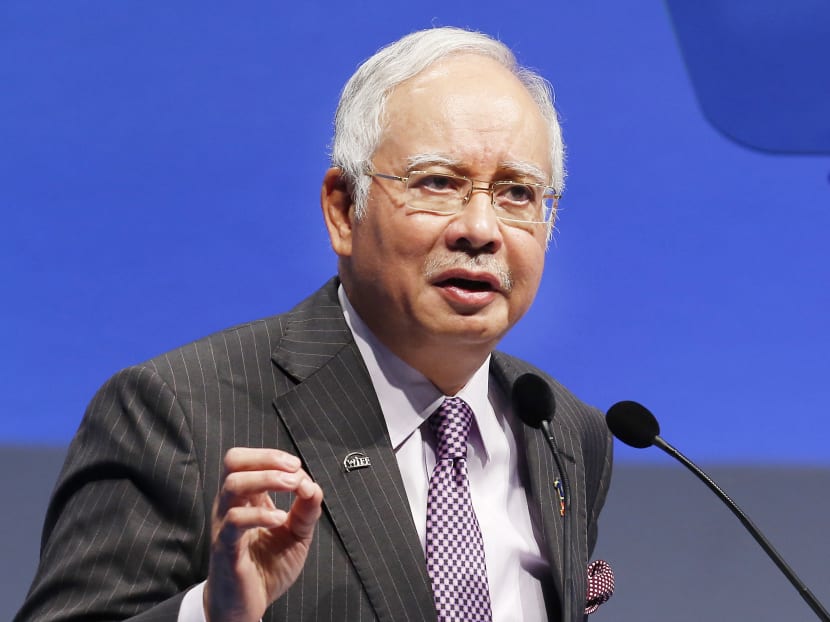Najib rolls back bid to remove Sedition Act
KUALA LUMPUR — Malaysian Prime Minister Najib Razak yesterday said a colonial-era law curbing free speech will be retained and strengthened, backpedalling on a pledge two years ago to abolish the Sedition Act as part of political reforms.

Malaysia’s Prime Minister Najib Razak says Pakatan Rakyat’s populist policies cannot work in the long run. PHOTO: REUTERS
KUALA LUMPUR — Malaysian Prime Minister Najib Razak yesterday said a colonial-era law curbing free speech will be retained and strengthened, backpedalling on a pledge two years ago to abolish the Sedition Act as part of political reforms.
Mr Najib had pledged in 2012 to repeal the Act — a relic of the British colonial era intended to keep a tight lid on racial tensions and social unrest in the multi-ethnic country — as part of a raft of liberal reforms to promote openness.
The 1948 law criminalises speech with an undefined seditious tendency or that insults the country’s traditional rulers, the Sultans. It has been criticised by rights groups and lawyers who say the Act inhibits freedom of speech and is used to stifle political dissent.
Mr Najib yesterday told a meeting of his ruling United Malays National Organisation (UMNO) party that the Act would be maintained and strengthened. He said it would be boosted with additions to defend the sanctity of Islam and penalise those who call for the separation of Sabah and Sarawak states from Malaysia.
In his policy speech at the start of the party’s general assembly yesterday, Mr Najib said the decision was made after consultation with party leaders, non-governmental organisations (NGOs) and grassroots members.
“I heard the motions, the concerns of the grassroots, views of NGOs. As Prime Minister, I have decided that the Sedition Act will be maintained,” Mr Najib said to rousing applause from the more than 2,700 delegates.
The Pakatan Rakyat opposition alliance, which has eroded the ruling coalition’s majority in two consecutive elections, says the Act is being employed selectively against its members, allies and social activists to undermine the alliance.
In only nine months this year, 12 cases have been prosecuted under the Act, the highest figure since 2009. At least five of the cases have centred on comments voiced about the Sultans or their powers.
Opposition leader Anwar Ibrahim yesterday flayed Mr Najib for not repealing the Act and said this was proof he was unable to stick to his reform agenda. He warned that repealing the Act would see Malaysians dragged back into the days of the ISA, referring to the now-abolished Internal Security Act that saw anti-government dissidents thrown behind bars without trial.
Mr Anwar, who was once an ISA detainee himself, called the move a regressive one and accused Mr Najib of bowing to pressure from right-wing elements in the ruling party.
“His weak leadership has resulted in him caving in to demands of the right-wingers of his own party. This is a flip-flop (and) Najib reneged on his earlier promise. This will be a return to the days of the ISA”.
The opposition Parti Keadilan Rakyat’s vice-president N Surendran said Mr Najib risked losing the trust of the people with the rollback. “How will the people trust him anymore? He has done the expedient thing instead of the right thing,” he said.
Meanwhile, former Prime Minister Abdullah Ahmad Badawi warned that the law should not be abused to help the party stay in power, but said he agreed with its retention. “In our enthusiasm to retain the Sedition Act, I remind UMNO members that the Act is not to be used to keep UMNO in power. Remember, if the people no longer support us, there is no law on God’s earth that can save UMNO from losing power.”
The Malaysian Indian Congress, a component party within Mr Najib’s ruling Barisan Nasional (BN) coalition, said the decision to maintain the Act was not discussed in advance with the BN’s component parties. “I don’t remember any discussion with the component parties,” said Dr S Subramaniam, the party’s deputy president and Health Minister, adding that the issue would now be raised at the party level.
Deputy Prime Minister Muhyiddin Yassin defended Mr Najib’s decision, saying the reversal was by no means an indication his reform agenda had failed, stressing that the Act is needed due to certain necessities. “He understands that the key reason the law has existed so long is for unity and solidarity, which we should defend and strengthen.” AGENCIES






